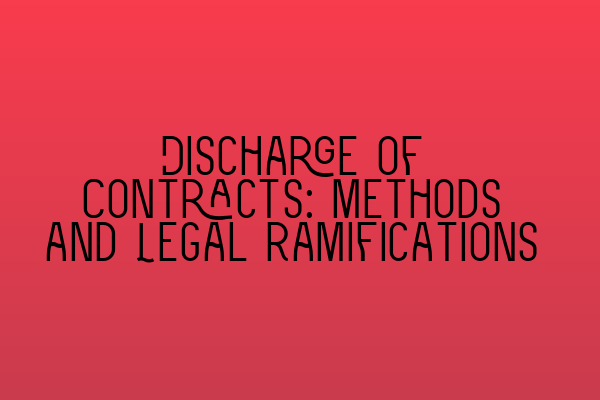Discharge of Contracts: Methods and Legal Ramifications
Contracts are a crucial aspect of business transactions and legal agreements. They provide a framework for parties to define their rights and obligations. However, there are situations where contracts need to be discharged, either by fulfillment, agreement, frustration, breach, or other legal circumstances. In this article, we will explore the various methods of discharging contracts and the legal ramifications associated with each method.
I. Discharge by Performance
The most straightforward way to discharge a contract is through performance. When both parties fulfill their obligations as outlined in the contract, the agreement is deemed complete. Performance can be either:
– Actual performance: Occurs when the parties execute all the required actions and deliver on their promises.
– Substantial performance: Refers to a situation where there is a minor deviation from the contract’s terms, but the primary purpose of the agreement is still accomplished.
Discharging a contract through performance not only fulfills the contractual obligations but also ensures a smoother business relationship. Both parties can have confidence in each other’s commitment to honor their obligations, fostering trust and goodwill.
II. Discharge by Agreement
Contracts can also be discharged when both parties mutually agree to release each other from their obligations. This can occur in several ways:
– Rescission: In the event of a mutual mistake, misrepresentation, undue influence, or duress, the parties can agree to rescind the contract, treating it as if it never existed.
– Novation: If the parties wish to substitute one contractual obligation for another, they may execute a novation agreement. This allows them to discharge the original contract and establish a new one.
– Accord and satisfaction: In situations where there is a dispute regarding the performance or payment terms, the parties may reach a settlement agreement, known as an accord and satisfaction. By accepting the agreed terms, both parties discharge their obligations under the original contract.
Discharging a contract by agreement requires clear communication and a mutual understanding of each party’s intentions. It is essential to document any such agreements in writing to avoid future disputes.
III. Discharge by Frustration
Sometimes, unforeseen circumstances arise that make it impossible to fulfill the contract’s terms. This is known as frustration. Frustration can occur due to various reasons such as:
– Death or incapacity of a party
– Destruction of the subject matter
– Changes in law or government regulations
– Unforeseeable events outside the control of the parties (e.g., natural disasters)
In cases of frustration, the contract is automatically discharged. However, the consequences of frustration can be complex and may have legal ramifications. For instance, the parties may need to account for any performed obligations or claim for restitution.
IV. Discharge by Breach
When one party fails to fulfill their obligations without any valid excuse, it results in a breach of contract. This breach can be either:
– Anticipatory breach: Occurs when one party announces or demonstrates their intention to not fulfill their obligations before the agreed-upon performance date.
– Actual breach: Refers to a situation where one party fails to perform as required, either partially or entirely, on the agreed-upon performance date.
In the event of a breach, the non-breaching party may be entitled to seek remedies such as damages, specific performance, or cancellation and restitution. The legal ramifications of a breach depend on various factors, such as the nature of the contract, the extent of the breach, and the available remedies.
V. Legal Ramifications of Contract Discharge
Understanding the legal ramifications of contract discharge is crucial to protect one’s rights and interests. Some potential legal ramifications include:
– Liability for damages: In cases of breach, the non-breaching party may be entitled to claim damages as compensation for any losses suffered.
– Restitution: When a contract is discharged, it may be necessary to account for any performed obligations and restore the parties to their pre-contractual positions.
– Future relationship impact: Discharging a contract can affect future business relationships and may impact the parties’ ability to enter into future agreements.
Conclusion
Discharging contracts is a complex area of contract law that has significant legal ramifications. Whether it is through performance, agreement, frustration, or breach, understanding the methods of contract discharge is essential for individuals and businesses alike. By having a clear understanding of these methods and the associated legal consequences, parties can navigate contract disputes and potential liabilities effectively.
For more information on contract law, legal careers, and related topics, check out these articles:
– Mentorship for Aspiring Solicitors: Nurturing Talent in the Legal Field
– Legal Challenges and Pitfalls: Navigating the Complexities of the Legal System
– The Benefits of Becoming a Solicitor: A Rewarding Career
– Law School in the UK: Your Guide to Starting Your Legal Journey
– Striking a Balance: Work-Life Harmony in the Legal Field
Remember, legal advice should always be sought for specific situations, and this article serves only as a general informational guide.
